Related Research Articles

William Lloyd Garrison was an American abolitionist, journalist, and social reformer. He is best known for his widely read anti-slavery newspaper The Liberator, which Garrison founded in 1831 and published in Boston until slavery in the United States was abolished by the Thirteenth Amendment in 1865.

The American Colonization Society (ACS), initially the Society for the Colonization of Free People of Color of America, was an American organization founded in 1816 by Robert Finley to encourage and support the repatriation of freeborn people of color and emancipated slaves to the continent of Africa. It was modeled on an earlier British colonization in Africa, which had sought to resettle London's "black poor".
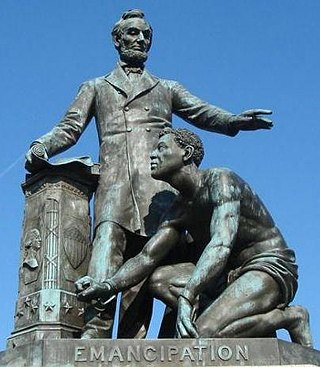
Abraham Lincoln's position on slavery in the United States is one of the most discussed aspects of his life. Lincoln frequently expressed his moral opposition to slavery in public and private. "I am naturally anti-slavery. If slavery is not wrong, nothing is wrong," he stated. "I can not remember when I did not so think, and feel." However, the question of what to do about it and how to end it, given that it was so firmly embedded in the nation's constitutional framework and in the economy of much of the country, even though concentrated in only the Southern United States, was complex and politically challenging. In addition, there was the unanswered question, which Lincoln had to deal with, of what would become of the four million slaves if liberated: how they would earn a living in a society that had almost always rejected them or looked down on their very presence.

David Stewart was an attorney and politician from Baltimore, Maryland. A Democrat, he was most notable for his service in the Maryland Senate and his brief service as an interim U.S. Senator from 1849 to 1850.
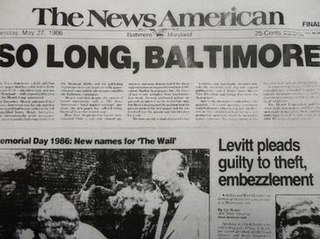
The Baltimore News-American was a broadsheet newspaper published in downtown Baltimore, Maryland until May 27, 1986. It had a continuous lineage of more than 200 years. For much of the mid-20th century, it had the largest circulation in the city.

The Republic of Maryland was a country in West Africa that existed from 1834 to 1857, when it was merged into what is now Liberia. The area was first settled in 1834 by freed African-American slaves and freeborn African Americans primarily from the U.S. state of Maryland, under the auspices of the Maryland State Colonization Society.

Freedom's Journal was the first African American owned and operated newspaper published in the United States. Founded by Rev. John Wilk and other free Black men in New York City, it was published weekly starting with the March 16, 1827 issue. Freedom's Journal was superseded in 1829 by The Rights of All, published between 1829 and 1830 by Samuel Cornish, the former senior editor of the Journal. The View covered it as part of Black History Month in 2021.

Lott Cary was an African-American Baptist minister and lay physician who was a missionary leader in the founding of the colony of Liberia on the west coast of Africa in the 1820s. He founded the first Baptist church in 1822, now known as Providence Baptist Church of Monrovia. He served as the colony's acting governor from August 1828 to his death in November that year.

During the American Civil War (1861–1865), Maryland, a slave state, was one of the border states, straddling the South and North. Despite some popular support for the cause of the Confederate States of America, Maryland did not secede during the Civil War. Governor Thomas H. Hicks, despite his early sympathies for the South, helped prevent the state from seceding.

Daniel Coker (1780–1846), born Isaac Wright, was an African American of mixed race from Baltimore, Maryland. Born a slave, after he gained his freedom, he became a Methodist minister in 1802. He wrote one of the few pamphlets published in the South that protested against slavery and supported abolition. In 1816, he helped found the African Methodist Episcopal Church, the first independent black denomination in the United States, at its first national convention in Philadelphia.
George Hume Steuart, (1700–1784) was a Scottish physician, tobacco planter, and Loyalist politician in colonial Maryland. Born in Perthshire, Steuart emigrated to Maryland in around 1721, where he benefited from proprietarial patronage and was appointed to a number of colonial offices, eventually becoming a wealthy landowner with estates in both Maryland and Scotland, and serving two terms as mayor of Annapolis. However, he was forced by the outbreak of the American Revolution to decide whether to remain loyal to the Crown or to throw in his lot with the American rebels. In 1775 Steuart sailed to Scotland, deciding at age 75 that "he could not turn rebel in his old age". He remained there until his death in 1784.
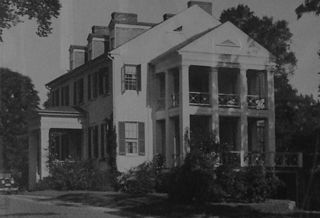
Dodon, is a 550-acre (2.2 km2) farm and former forced-labor tobacco plantation in Maryland, located near the South River about 10 miles (16 km) south west of Annapolis. Purchased in 1747 by the planter and politician Dr George H. Steuart, it remains the home of Steuart's descendants to this day. Steuart grew wealthy during the colonial era thanks to proprietarial patronage and the forced labor of enslaved people, but his family's prosperity and status was much reduced by the American Revolution and later by the American Civil War.

Richard Sprigg Steuart (1797–1876) was a Maryland physician and an early pioneer of the treatment of mental illness. In 1838 he inherited four contiguous farms, totalling approximately 1900 acres as well as 150 slaves.

George Hume Steuart (1790–1867) was a United States general who fought during the War of 1812, and later joined the Confederate States of America during the Civil War. His military career began in 1814 when, as a captain, he raised a company of Maryland volunteers, leading them at both the Battle of Bladensberg and the Battle of North Point, where he was wounded. After the war he rose to become major general and commander-in-chief of the First Light Division, Maryland Militia.
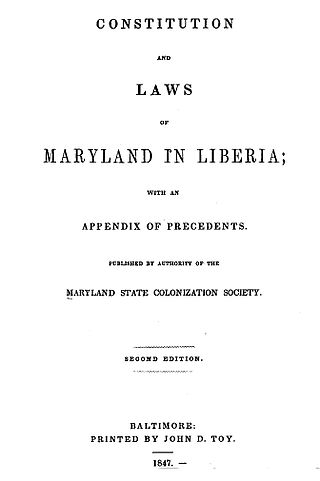
The Maryland State Colonization Society was the Maryland branch of the American Colonization Society, an organization founded in 1816 with the purpose of returning free African Americans to what many Southerners considered greater freedom in Africa. The ACS helped to found the colony of Liberia in 1821–22, as a place for freedmen. The Maryland State Colonization Society was responsible for founding the Republic of Maryland in West Africa, a short lived independent state that in 1857 was annexed by Liberia. The goal of the society was "to be a remedy for slavery", such that "slavery would cease in the state by the full consent of those interested", but this end was never achieved, and it would take the outbreak of the Civil War to bring slavery to an end in Maryland.

Slavery in Maryland lasted over 200 years, from its beginnings in 1642 when the first Africans were brought as slaves to St. Mary's City, to its end after the Civil War. While Maryland developed similarly to neighboring Virginia, slavery declined in Maryland as an institution earlier, and it had the largest free black population by 1860 of any state. The early settlements and population centers of the province tended to cluster around the rivers and other waterways that empty into the Chesapeake Bay. Maryland planters cultivated tobacco as the chief commodity crop, as the market for cash crops was strong in Europe. Tobacco was labor-intensive in both cultivation and processing, and planters struggled to manage workers as tobacco prices declined in the late 17th century, even as farms became larger and more efficient. At first, indentured servants from England supplied much of the necessary labor but, as England's economy improved, fewer came to the colonies. Maryland colonists turned to importing indentured and enslaved Africans to satisfy the labor demand.

Virgil Maxcy was an American political figure. He was born in Massachusetts and spent his adult years in Maryland. He was killed in 1844 in a shipboard accident, when a cannon exploded aboard USS Princeton.

Henry O. Wagoner was an abolitionist and civil rights activist in Chicago and Denver. In the 1830s, as a free black man in Maryland, he worked on a farm and worked to free slaves with a loose group of individuals that is known as the Underground Railroad. He left Maryland in 1838 under suspicion for his activities and settled in Illinois and eventually Chicago after spending a few years in Chatham, Ontario. Continuing to work with the Underground Railroad, he was also a typesetter and journalist for radical anti-slavery newspapers before the abolition of slavery in Chicago. Around this time he befriended Frederick Douglass, with whom he would remain close throughout his life. During the American Civil War (1861–1865), he helped recruit black soldiers for Illinois and Massachusetts regiments. After the war, he moved to Denver, where he had spent some time previously. He continued to be a leader in Denver, working to secure blacks the right to vote and equality in education and under the law.
William J. Watkins Sr. was an African-American abolitionist, educator, and minister from Baltimore, Maryland.
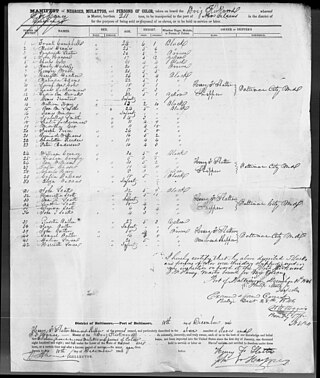
Henry Flewellen Slatter was a 19th-century American slave trader. Among other things, Slatter escorted coastwise shipments of people from slave jail of his father Hope H. Slatter in Baltimore to the slave depot of his uncle Shadrack F. Slatter in New Orleans. H. F. Slatter died of tuberculosis in his father's home state of Georgia.